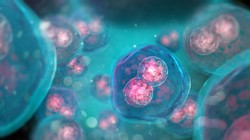The molecular dynamics of mitotic progression
Following cell cycle progression, proteins that are no longer required by the cell are targeted for degradation. This ensures the unidirectionality of mitotic progression and is delivered by the anaphase promoting complex or cyclosome (APC/C). APC/C is essentially a E3 ubiquitin ligase that adds ubiquitin residues on proteins and send them for proteolysis. Despite its central role in mitotic progression, the molecular mechanisms activating the APC/C towards different substrates are poorly defined. To address this, scientists on the EU-funded APCACTIVATION (Deciphering the dynamics and molecular mechanisms of APC/C activity in vitro and in live cells) project set out to characterise the APC/C-dependent ubiquitylation activity in live cells. As a first step, they monitored the release of fluorescence resonant energy transfer (FRET) fluorophores following the ubiquitylation of fluorescent cyclins. However, this approach was not sensitive enough for quantifying ubiquitylation, possibly due to molecular or geometrical constraints. In another part of the project, researchers used different fluorescently labelled substrates to compare the ubiquitylation activity of APC/C at different phases of the cell cycle. They tested the requirement of different co-factors for substrate ubiquitylation by the APC/C and compared the kinetics. They found that the mitotic checkpoint complex (MCC) inhibited APC/C and identified the binding motifs of the Cdc20 activator that were responsible for this observation. Overall, the activities of the project could serve as the basis for the future elaboration of the molecular mechanisms that govern mitotic progression in human cells. This is important in comprehending another angle of the uncontrolled cell proliferation of cancer cells and identifying novel therapeutic targets.







